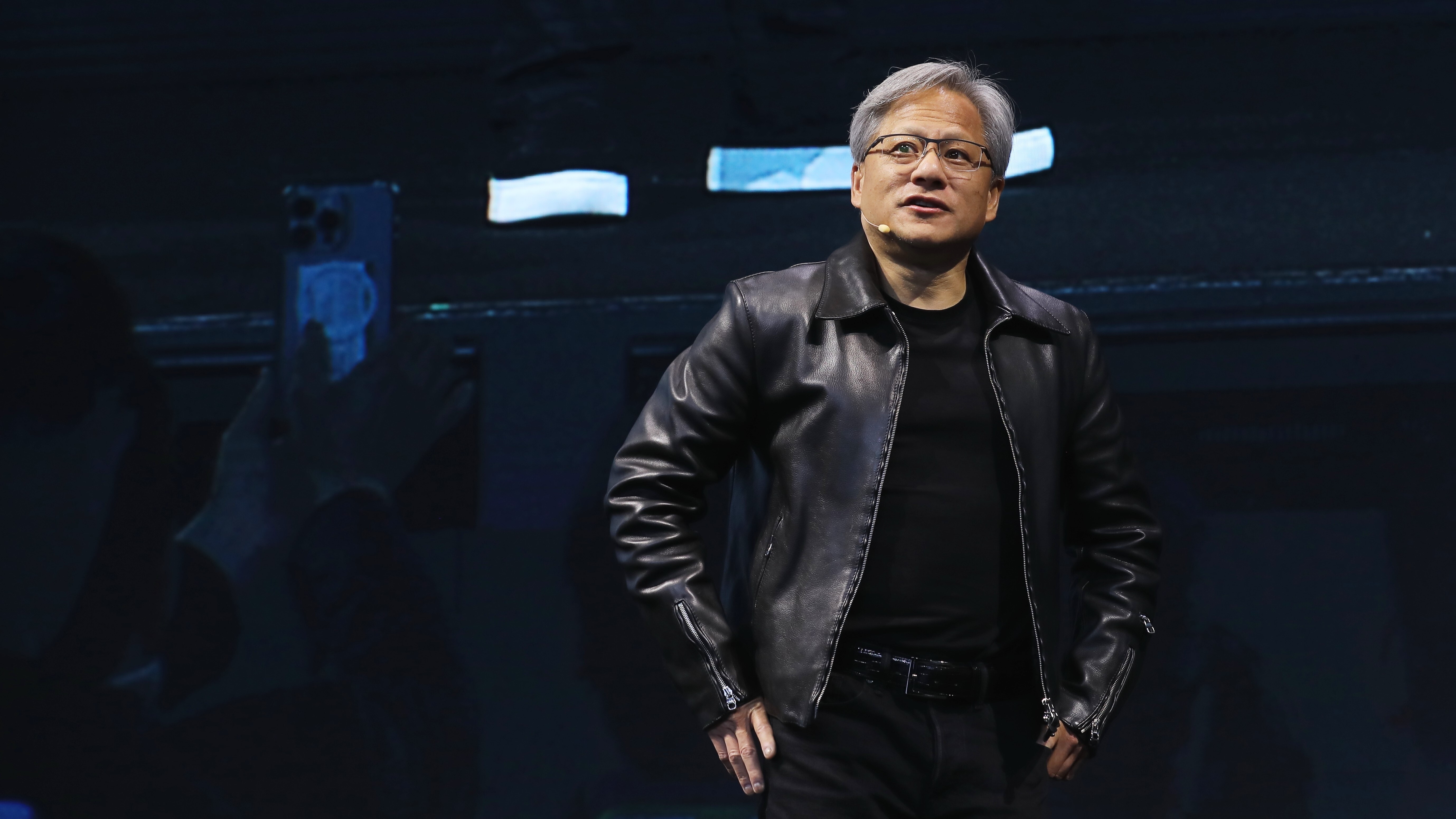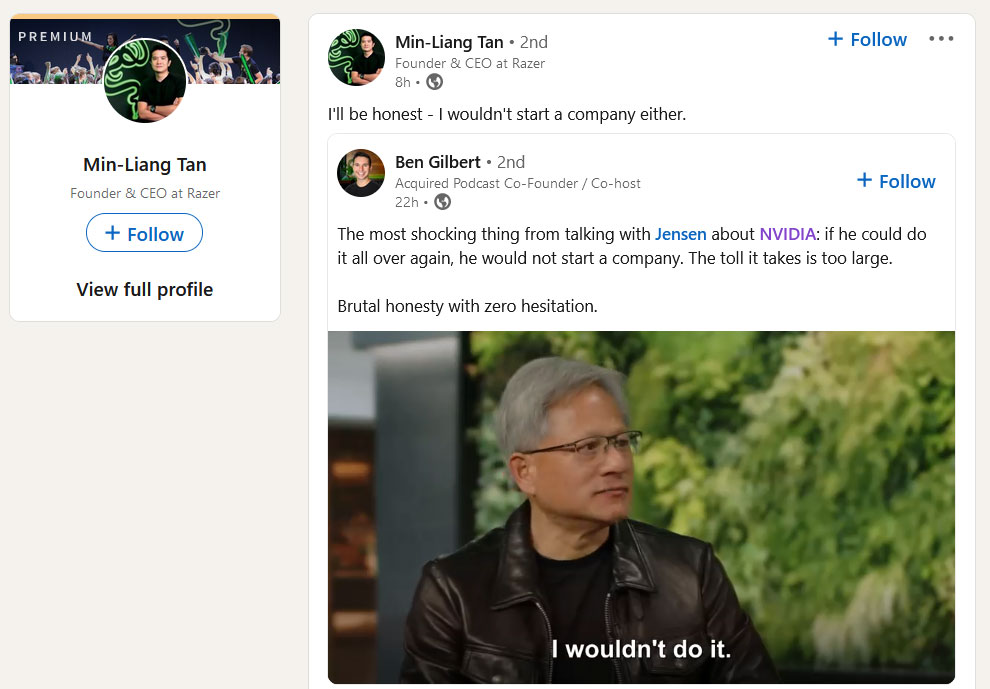Nvidia Wouldn't Exist if CEO Could Turn the Clock Back 30 Years
The pain, suffering, and embarrassment have been too much.

In Nvidia's 30th anniversary year, CEO Jensen Huang has taken part in a wide-ranging interview with AcquiredFM. During the interview, Huang told the hosts that if he were magically 30 again, he wouldn't want to start Nvidia. This is something of a surprise, coming from the founder of one of PC tech's biggest successes and now a trillion-dollar firm.
The lengthy interview with AcquiredFM hosts Ben and David contains some fascinating insight, especially about pivotal times during the early days of Nvidia. The most curious thing to hear is that Jensen Huang wouldn't follow the same path if he could turn back the clock by 30 years.
Huang is very candid about his reasons for not wanting to follow the same path again. "Building Nvidia turned out to be a million times harder than I expected it to be," the Nvidia CEO told the interviewers. With a 20:20 vision of times gone by, many would change some aspects of their life, but Nvidia is such a resounding success it is hard to consider it a source of regret for a founder.
The Superpower of an Entrepreneur
Huang hints that there is something inside him (and other entrepreneurs), which means they push ahead with projects that others consider impossible. He told the interviewers that the "superpower of an entrepreneur" is facing enormous tasks and asking themselves, "How hard can it be?" Huang asked himself this question before founding Nvidia as a PC graphics company and subsequently starting the other major ventures Nvidia has made breakthroughs in - like AI and automotive.
If the above sounds somewhat negative, Huang's tone in this part of the interview isn't really regretful but more like an impassive observer. He wouldn't willingly follow the whole journey again, saying, "I think it's too much. It is just too much." He references feelings like pain, suffering, shame, and embarrassment. Nevertheless, Huang lives positively and assures the interviewers, "I'm still enjoying myself immensely and I'm adding a little bit of value, but that's really the trick of an entrepreneur." Moreover, he says he is still fooling himself that things are easier than prior experience might indicate.
Riva 128 Retrospective
Older readers who have watched Nvidia's progress over the years may be interested in the major opening part of the AcquiredFM interview. In this section, Huang talks about the pivotal 'reset' to Nvidia, which precipitated the Riva 128 graphics card in 1997.
The Nvidia CEO says the company had its back against a wall, and decided to go all-in with Microsoft DirectX acceleration. It wanted to make the biggest chip, with the largest quantity of the fastest memory available at the time - and at a cost point substantially higher than rivals dared.
Get Tom's Hardware's best news and in-depth reviews, straight to your inbox.
However, with just six months of cash left and no spare funds, Nvidia didn't do physical chip testing, only testing the Riva 128 using simulation before the production run. It turned out that only eight out of 32 DirectX blend modes were supported by shipping silicon. Nevertheless, the Riva 128 succeeded for several reasons, including its delivery of the "world's first fully accelerated hardware-accelerated pipeline for rendering 3D."
Razer Boss: Me Too
Razer CEO Min-Liang Tan commented upon the AcquiredFM video a few hours ago. We aren't sure if the Razer boss was being serious, but he wrote that "I'll be honest - I wouldn't start a company either," on his LinkedIn feed.

Mark Tyson is a news editor at Tom's Hardware. He enjoys covering the full breadth of PC tech; from business and semiconductor design to products approaching the edge of reason.
-
helper800 'You know if I could do it all over again I wouldn't start a trillion dollar monopoly...'Reply -
ezst036 I can't say I blame the guy.Reply
Most people have the mistaken view that a CEO works like 5 hours a week and plays golf all the time. This is a propaganda caricature. CEOs of successful companies often times miss their children's most important moments, they lack hobbies, and have very few friends. It ends up that their company is all they have. -
vanadiel007 Well, sounds like the perfect time to step down as CEO and enjoy life. I am sure a perfectly capable CEO can be found.Reply -
Zerk2012 I call crap on that he could of retired 10 years ago and had more money than most people will ever make.Reply -
elforeign Thanks for pointing us to this interview. It was really fascinating to hear about how Nvidia started and the direction they were heading in, how Riva 128 took the company in a whole different direction and also to understand how the evolution of the graphics processor and CUDA to the datacenter have all shaped the company and guide its path forward.Reply
Jensen provided a lot of insight and commentary in this interview which was quite refreshing. I enjoyed listening to the interview and good questions were asked as well to keep the conversation invigorating for the 1.5 hours. -
gg83 I hate hearing no and I can't stand having too much responsibility. I know I could never have the drive to own a business of any kinds. Having everyone bring you problems with the expectation of an instantaneous fix would make me nuts. I believe both CEO's are being honest.Reply -
gg83 Reply
Absolutely agree.elforeign said:Thanks for pointing us to this interview. It was really fascinating to hear about how Nvidia started and the direction they were heading in, how Riva 128 took the company in a whole different direction and also to understand how the evolution of the graphics processor and CUDA to the datacenter have all shaped the company and guide its path forward.
Jensen provided a lot of insight and commentary in this interview which was quite refreshing. I enjoyed listening to the interview and good questions were asked as well to keep the conversation invigorating for the 1.5 hours. -
sauve.richard Reply
I call crap on that comment, he could have retired 10 years ago and had more money than most people would ever DREAM OF. Just sayin' ;)Zerk2012 said:I call crap on that he could of retired 10 years ago and had more money than most people will ever make. -
DSzymborski Replysauve.richard said:I call crap on that comment, he could have retired 10 years ago and had more money than most people would ever DREAM OF. Just sayin' ;)
I think the more likely scenario is the compulsion that led him to start the company and work so hard to make it a success also makes walking away from it extremely difficult. While people can change things about themselves, it's hard to fundamentally change the way you tick.

